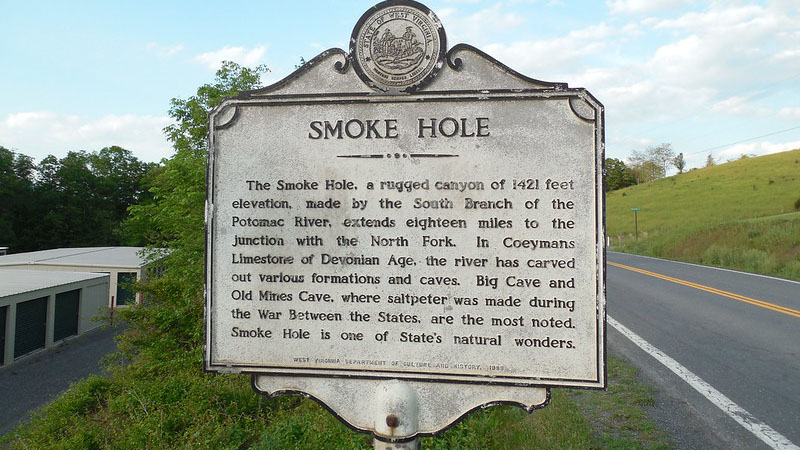“Smoke Hole Historic Marker” by Jimmy Emerson, DVM is licensed under CC BY-NC-ND 2.0
In the fall, we go camping; we drive for five hours to get to Smoke Hole, West Virginia, even though there are plenty of campsites around Baltimore, even though there are beach campgrounds and wooded campgrounds and lakeside campgrounds within an hour’s drive.
We drive to Smoke Hole because, when the GPS cuts off and you dip the car off the pavement onto the dirt roadway that leads you through the woods, you can roll your windows down and the rush of the river running parallel sounds wilder than the wind.
We drive to Smoke Hole because it’s far enough away that we can forget about showers and just rinse off in the river now and then; we can sling back sangria that’s been soaking in cherries and oranges for days, and the echoes of our laughter can carry five campsites over as the sweet notes ricochet off mountainsides.
We drive to Smoke Hole because there is no cell service for miles, a fact we must convince our bosses of when they say, what do you mean you’re unreachable? and the search engine spits out data on dead zones and radio interference and broadcast transmitters.
We drive to Smoke Hole because there is a community dinner on Sundays, when everyone brings a dish, and you’d think over a campfire it would just be hot dogs and s’mores but it’s actually: ceviche chilled on ice with lime zest served in avocado boats, and slow cooked pulled pork that’s been buried under the fire pit all day, and BLTs with smoky bacon crisped up so perfectly it crunches and melts on tongues all the same.
We drive to Smoke Hole because at dusk, when the moon swings up over the top of the Allegheny Mountains, it shines a beam right onto the riverbank where the campers rest guitars in their laps and crow and strum and croon. In the canyon, their words ooze with the gentle grace of the river’s soft midnight waltz. Their voices crackle like kindling, and the lyrics stick inside your eardrums like river mud between your toes, and the warmth of letting everything go tickles the back of your neck like the swish of uncut grass under bare feet.
We haven’t been camping in years now, because we had kids and we had jobs that wouldn’t let us go off the grid anymore, and there was (still is) a pandemic. We’ve been busy trying to keep the kids healthy and safe, and worrying that they won’t have locks on doors in school classrooms, or rights to their own bodies, or a livable planet, but mostly we hope when they grow up, they’ll have some place like Smoke Hole.
Annie Marhefka is a writer in Baltimore, Maryland. Her creative nonfiction and poetry have been published by Hobart Pulp, Literary Mama, Pithead Chapel, Anti-Heroin Chic, and Corporeal, among others. Annie is the Executive Director at Yellow Arrow Publishing, a Baltimore-based nonprofit supporting and empowering women writers, and is working on a memoir about mother/daughter relationships. You can find Annie’s writing on Instagram @anniemarhefka, Twitter @charmcityannie, and at anniemarhefka.com.

